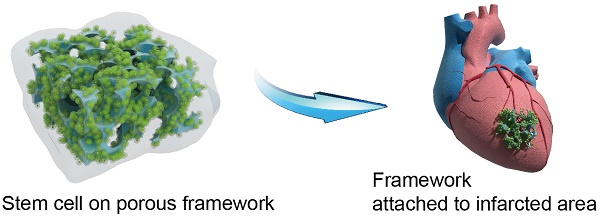当前位置:
X-MOL 学术
›
Theranostics
›
论文详情
Our official English website, www.x-mol.net, welcomes your
feedback! (Note: you will need to create a separate account there.)
Neonatal Heart-Enriched miR-708 Promotes Proliferation and Stress Resistance of Cardiomyocytes in Rodents
Theranostics ( IF 12.4 ) Pub Date : 2017-05-02 , DOI: 10.7150/thno.16478 Shengqiong Deng , Qian Zhao , Lixiao Zhen , Chuyi Zhang , Cuicui Liu , Guangxue Wang , Lin Zhang , Luer Bao , Ying Lu , Lingyu Meng , Jinhui Lü , Ping Yu , Xin Lin , Yuzhen Zhang , Yi-Han Chen , Huimin Fan , William C. Cho , Zhongmin Liu , Zuoren Yu
Theranostics ( IF 12.4 ) Pub Date : 2017-05-02 , DOI: 10.7150/thno.16478 Shengqiong Deng , Qian Zhao , Lixiao Zhen , Chuyi Zhang , Cuicui Liu , Guangxue Wang , Lin Zhang , Luer Bao , Ying Lu , Lingyu Meng , Jinhui Lü , Ping Yu , Xin Lin , Yuzhen Zhang , Yi-Han Chen , Huimin Fan , William C. Cho , Zhongmin Liu , Zuoren Yu

|
Adult heart has limited potential for regeneration after pathological injury due to the limited cell proliferation of cardiomyocytes and the quiescent status of progenitor cells. As such, induction of cell-cycle reentry of cardiomyocytes is one of the key strategies for regeneration of damaged heart. In this study, a subset of miRNAs including miR-708 were identified to be much more abundant in the embryonic and neonatal cardiomyocytes than that in adult rodents. Overexpression of miR-708 promoted cellular proliferation of H9C2 cells or primary cardiomyocytes from neonatal rats or mice in vitro. Lipid nanoparticle delivery of miR-708 promoted myocardial regeneration and heart function recovery in vivo. In addition, miR-708 protected cardiomyocytes against stress-induced apoptosis under hypoxia or isoproterenol treatments. miR-708 inhibited the expression of MAPK14, which has been demonstrated arresting the cell cycle in cardiomyocytes. The cell proliferation-promoting function of miR-708 was dependent at least partly on the expression of MAPK14. These findings strengthen the potential of applying miRNAs to reconstitute lost cardiomyocytes in injured hearts, and may provide a novel miRNA candidate for promoting heart regeneration.
中文翻译:

新生儿富含心脏的miR-708促进了啮齿动物心肌细胞的增殖和抗逆性
由于心肌细胞有限的细胞增殖和祖细胞的静止状态,成年心脏在病理损伤后具有再生的潜力有限。这样,诱导心肌细胞的细胞周期再进入是再生受损心脏的关键策略之一。在这项研究中,与成人啮齿类动物相比,包括miR-708在内的miRNA的一个子集在胚胎和新生儿心肌细胞中的含量要高得多。miR-708的过表达促进新生大鼠或小鼠体外H9C2细胞或原代心肌细胞的细胞增殖。miR-708脂质纳米颗粒的递送促进了体内的心肌再生和心脏功能的恢复。另外,miR-708在缺氧或异丙肾上腺素治疗下保护心肌细胞免受应激诱导的细胞凋亡。miR-708抑制了MAPK14的表达,这已被证实可阻止心肌细胞的细胞周期。miR-708的细胞增殖促进功能至少部分取决于MAPK14的表达。这些发现增强了应用miRNA重建受损心脏中丢失的心肌细胞的潜力,并可能为促进心脏再生提供一种新型的miRNA候选物。
更新日期:2017-07-01
中文翻译:

新生儿富含心脏的miR-708促进了啮齿动物心肌细胞的增殖和抗逆性
由于心肌细胞有限的细胞增殖和祖细胞的静止状态,成年心脏在病理损伤后具有再生的潜力有限。这样,诱导心肌细胞的细胞周期再进入是再生受损心脏的关键策略之一。在这项研究中,与成人啮齿类动物相比,包括miR-708在内的miRNA的一个子集在胚胎和新生儿心肌细胞中的含量要高得多。miR-708的过表达促进新生大鼠或小鼠体外H9C2细胞或原代心肌细胞的细胞增殖。miR-708脂质纳米颗粒的递送促进了体内的心肌再生和心脏功能的恢复。另外,miR-708在缺氧或异丙肾上腺素治疗下保护心肌细胞免受应激诱导的细胞凋亡。miR-708抑制了MAPK14的表达,这已被证实可阻止心肌细胞的细胞周期。miR-708的细胞增殖促进功能至少部分取决于MAPK14的表达。这些发现增强了应用miRNA重建受损心脏中丢失的心肌细胞的潜力,并可能为促进心脏再生提供一种新型的miRNA候选物。











































 京公网安备 11010802027423号
京公网安备 11010802027423号